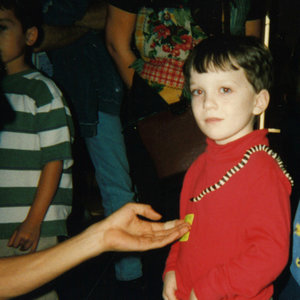Angelo De Augustine: Tomb (Asthmatic Kitty)
The third LP by the Californian songwriter is a variable collection
Released Jan 18th, 2019 via Asthmatic Kitty / By Emilie Kneifel
 The first track on Angelo De Augustine’s third LP is all sun-filled rain. But the guitar and piano’s peering quickly gets repetitive, as if it should have been a sparkling intro rather than a four minute song. All to the Wind is a piano ditty that shrugs. You Needed Love, I Needed You is a twilight song, whispered without the sun.
The first track on Angelo De Augustine’s third LP is all sun-filled rain. But the guitar and piano’s peering quickly gets repetitive, as if it should have been a sparkling intro rather than a four minute song. All to the Wind is a piano ditty that shrugs. You Needed Love, I Needed You is a twilight song, whispered without the sun.De Augustine’s melodies are pretty and evergreen, but their needles don’t feel new. His lightheaded vocals recall Chicago’s Whitney, and though comparing this kind of shivering folk to Sufjan Stevens may seem too easy, Tomb was released on Stevens’ label. It splashes in the same pool as Carrie and Lowell -- weary finger-plucking, holy synths -- but it can’t plunge where Carrie and Lowell swan dived.
The sweet sours, because De Augustine doesn’t seem to know how to have his own longing. At least three songs are explicitly sung to someone named Kaitlin, but aren’t about her at all; they’re about him and how he feels wronged. How he is entitled to what he has lost, or was never his. And sure, maybe desire never has anything to do with the desired. But then, well, don’t name one of the songs after her. Don’t say “I hope you hear this song,†as if you posted something just so that a specific person would see it. Don’t make it look like it has anything to do with her, if it doesn’t.
This album is a puppy dog subtweet typed under the pretense that De Augustine, canopied by twinkling forest music, is a good guy. “Now your life shouldn’t begin,†he sings, his voice misleadingly tender, the melody somehow reassuring. He actually offers to “treat you unkindly if that’s what you want.†And still he accuses her of blowing out “a good man’s light.â€
There is such a thing as yearning that is manipulative, that can be used to twist someone’s arm tight. This retributional desire corrupts what desire should be: a precious tension, a Mitski pearl, that is yours alone to admire through the night.
Sad music has utility: it can make room for drooping emotion to breathe, to sob, to make something of itself. But this isn’t even that kind of music. You’re just left angry that you let someone so wallow in your ears, turning them mossy for twelve songs entirely. 3/5





 All Content RSS Feed
All Content RSS Feed
Follow Bearded on...